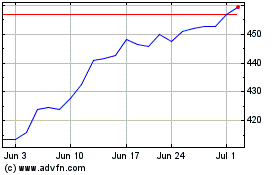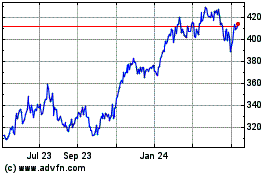Justices Drop Case On Email Searches -- WSJ
April 18 2018 - 3:02AM
Dow Jones News
By Brent Kendall
This article is being republished as part of our daily
reproduction of WSJ.com articles that also appeared in the U.S.
print edition of The Wall Street Journal (April 18, 2018).
WASHINGTON -- The Supreme Court on Tuesday dropped a case that
examined whether emails and other data stored overseas are subject
to U.S. search warrants, after Congress passed a law that allows
such actions.
The case had pitted federal and state authorities against an
array of leading tech companies. It centered on a dispute between
the Justice Department and Microsoft Corp., which resisted
complying with a warrant that sought emails from an account
allegedly tied to illegal drug activity.
Microsoft had stored the emails in Ireland and said U.S.
warrants didn't reach beyond domestic borders. The Justice
Department said the warrant was enforceable because the government
sought disclosure in the U.S., where Microsoft is based. It had
warned that a win for the company would hamper federal and state
investigations into an array of crimes.
The Supreme Court heard oral arguments in February, and several
justices expressed frustration at having to decide the case under a
1986 federal law on electronic records that Congress adopted before
email and cloud-computing were everyday tools.
Now, they don't have to. Weeks after the argument, Congress
passed legislation to modernize the law and give law enforcement
access to data even if it is stored overseas.
"This case, therefore, has become moot," the court wrote in a
three-page opinion.
Both the Justice Department and Microsoft had filed court papers
agreeing the case was no longer a live dispute.
The Supreme Court also wiped out an appeals-court ruling that
Microsoft won during an earlier stage of the case, as well as an
earlier contempt finding against the Redmond, Wash., software
giant.
Congress passed the new law, called the Cloud Act, as part of a
$1.3 trillion spending bill last month. It had won support from
tech titans like Microsoft and Alphabet Inc.'s Google that have
battled the government on access to overseas data, but some privacy
advocates criticized the law's data protections as too weak.
The act makes clear that warrants can apply to data that
U.S.-based tech companies store around the world. Tech firms, in
turn, have a right to challenge warrants in court based on privacy
laws in the country where the data are stored.
The legislation also allows for bilateral agreements between the
U.S. and other nations about how to address future data disputes,
including other countries' requests for data in the U.S.
"Our goal has always been a new law and international agreements
with strong privacy protections that govern how law enforcement
gathers digital evidence across borders," said Brad Smith,
Microsoft's president and chief legal officer. "As the governments
of the U.K. and Australia have recognized, the Cloud Act encourages
these types of agreements, and we urge the U.S. government to move
quickly to negotiate them."
A Justice Department spokeswoman declined to comment.
--Brent Kendall
Write to Brent Kendall at brent.kendall@wsj.com
(END) Dow Jones Newswires
April 18, 2018 02:47 ET (06:47 GMT)
Copyright (c) 2018 Dow Jones & Company, Inc.
Microsoft (NASDAQ:MSFT)
Historical Stock Chart
From Mar 2024 to Apr 2024

Microsoft (NASDAQ:MSFT)
Historical Stock Chart
From Apr 2023 to Apr 2024
